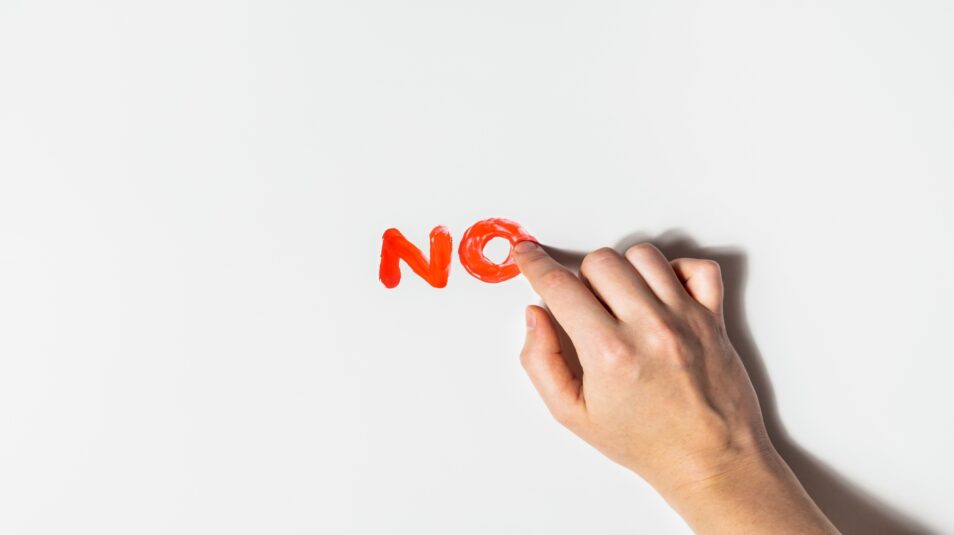Boundaries gone amuck

Personal Development
March 9, 2021
Jane Perdue
Executive Director, The Jane Group
Topics
boundaries, Growth, personal boundaries, personal development, personal growth, self-awarenessPersonal boundaries are good—no, great—to have, provided we let them assist and guide our growth, not stifle it.
Maggie and Zeke lived at opposite ends of openness to risk. When exposed to anything new, Maggie’s first thought was either I can’t do it or I don’t like it. She never ventured beyond the boundaries of her small but safe comfort zone. She frequently felt frustrated and alone. Zeke, on the other hand, was perpetually wading into the unknown and had both the physical and psychological scars and successes to prove it.
For both Maggie and Zeke, their boundary for risk had gotten out of whack without them realizing what had happened. That lack of recognition and awareness of boundaries shifting away from balance happens to all of us occasionally. We miss the symptoms that our boundaries are no longer serving us well.
Do any of the following boundary glitches apply to you?
- My circle of friends is the same as it was five years ago.
- I eat what I know I like, so I never try a new food.
- I bounce from one new experience to the next, rarely sticking with anything or anyone too long.
- People disregard my wants and feelings.
- I let others make my decisions for me.
- People routinely describe me as domineering.
- People are always asking me to do favors for them.
- When I see someone failing to take control, I jump in and do it for them.
- I often making sacrifices for others as the expense of myself.
- People regularly annoy me by what they say and do.
Boundaries are the guidelines, limits, and rules we set for ourselves to determine what we believe is acceptable or not. Personal boundaries define how we want to treat others and be treated in return—be it emotionally, socially, intellectually, materially, spiritually, and physically.
“Boundaries define us. They define what is me and what is not me. A boundary shows me where I end and someone else begins, leading me to a sense of ownership. Knowing what I am to own and take responsibility for gives me freedom.” ~Henry Cloud, psychologist and author of Boundaries
We construct our boundaries from a mix of internal and external factors that include social learning, values, beliefs, past experiences, cultural heritage, conclusions and assumptions, family dynamics, attitudes, perspectives, and opinions. Our boundaries define how comfortable we are in making our voice heard and in expressing our needs. Serving as a measurement of self-worth, our personal boundaries reflect our respect for ourselves and others.
“When we fail to set boundaries and hold people accountable, we feel used and mistreated.” ~Brene Brown, professor and author
The repercussions of boundaries that are too rigid, too many, or too few are detrimental. We let others define us. We smother the rights of those around us. We sacrifice our identity or try to define the identity of others for them. When our boundaries are out of whack, we fail to grow, develop, think critically, care, or share.
The secret ingredient for having personal boundaries that facilitate our growth and development is to avoid the extremes. Something that both Maggie and Zeke failed to do. Avoiding the extremes is possible. To avoid them, we need to monitor many little and big things we regularly do.
To keep your self-awareness ticking, routinely ask yourself these questions.
- Do I say no, simply and firmly, and mean it?
- Am I using guilt or fear to manipulate others?
- Do I think I have to solve other people’s problems?
- Am I attuned to my feelings?
- Do I know my limits?
- Do I believe I’m OK the way I am?
- Are my values changing?
- Do I know when to flex?
- Do I manage my fears or let them manage me?
- Have I made my boundaries known and assert myself when they’re breached?
- Am I giving myself room to grow?
- Do I safeguard all my spaces?
- Do I refuse to be a victim or a tyrant?
It’s good that boundaries aren’t set in stone because fluidity is necessary for growth. However, it’s up to us to keep our boundaries in check. As the end of the pandemic is in sight, perhaps now’s a good time to take stock of where we stand.
“We have all come from unique families of origin. We each make different meaning of situations. And we may change our own boundaries over the years as we mature and our perspective shifts. One standard cannot hold for all. Rather, each person needs to find that level of comfort within themselves.” ~Jenn Kennedy, therapist




